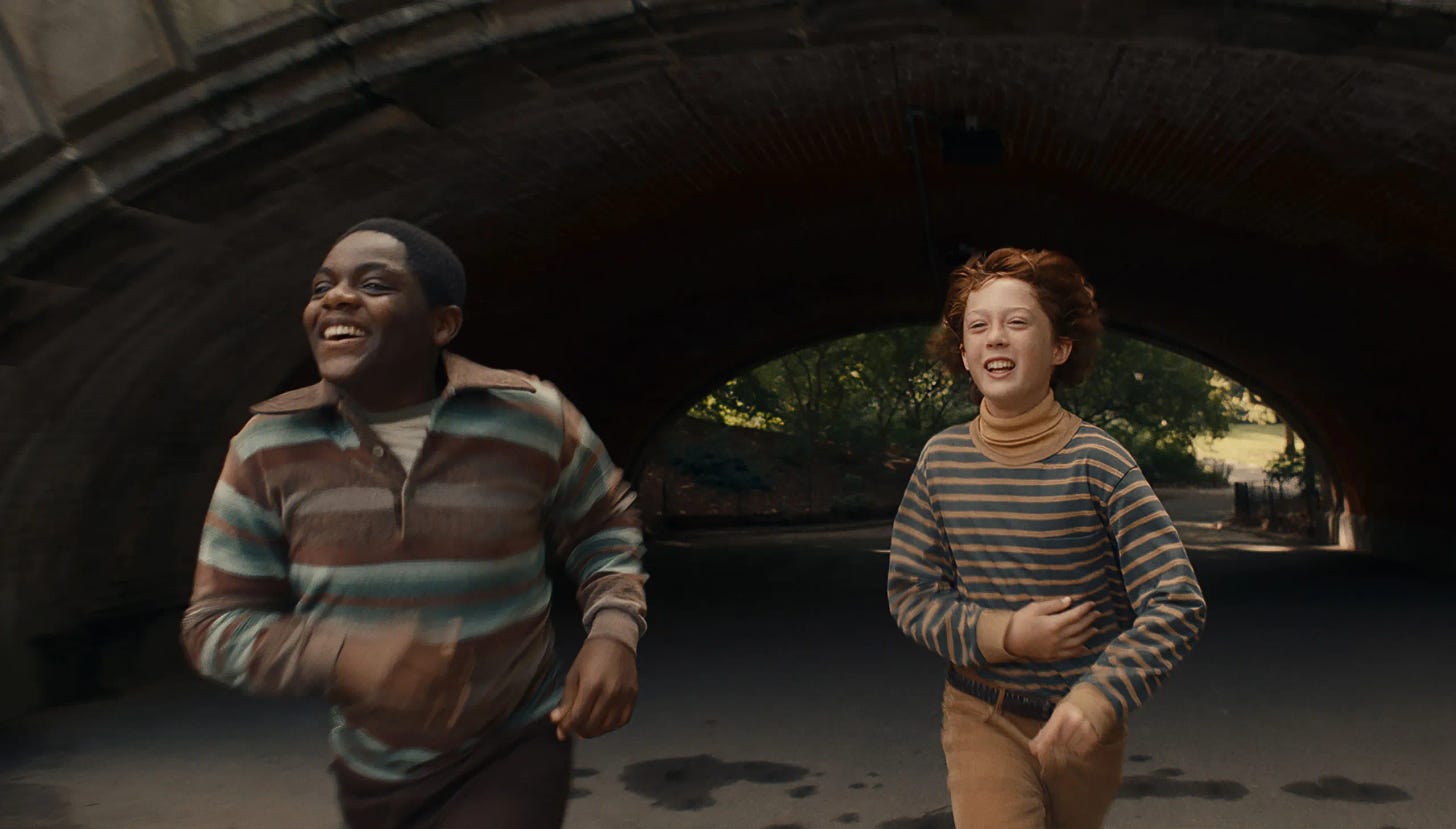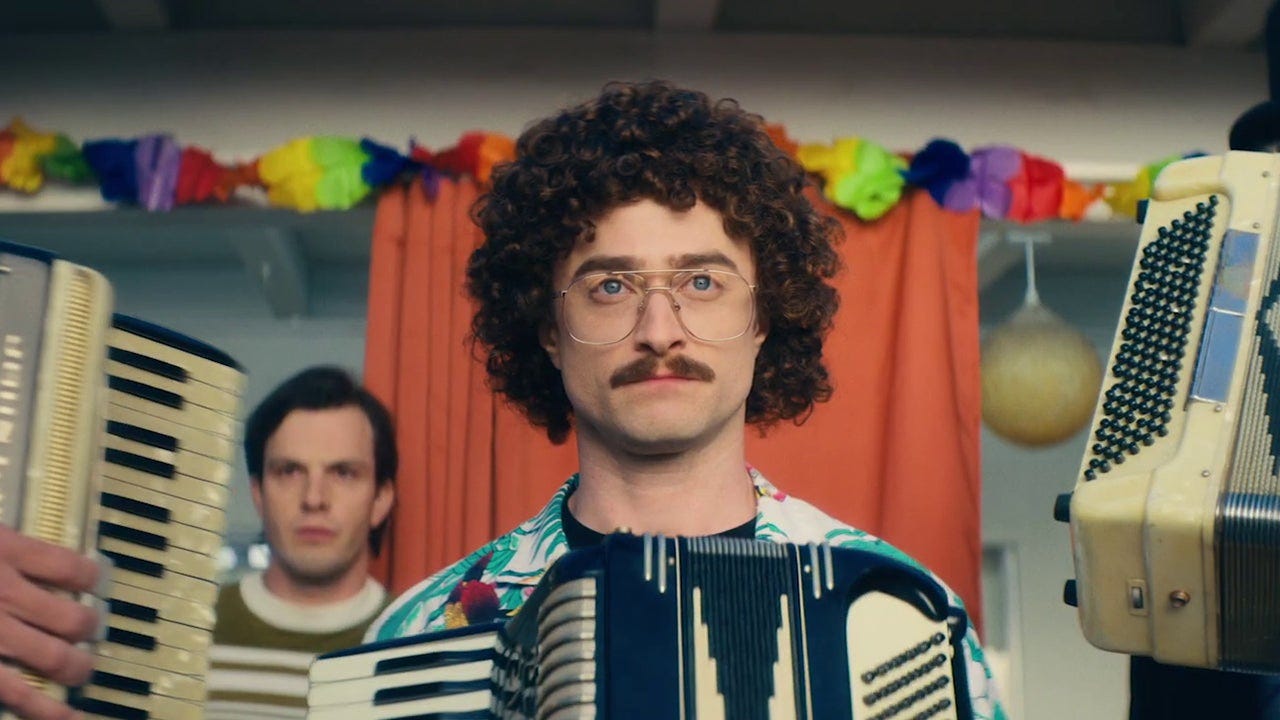In Review: 'Armageddon Time,' 'Causeway,' 'Weird: The Al Yankovic Story'
James Gray looks back on his past in an anti-nostalgia piece, Jennifer Lawrence and Brian Tyree Henry dig into a low-key drama and Weird Al mythologizes himself.
Armageddon Time
Dir. James Gray
115 min.
Through the hazy filtered light of ace cinematographer Darius Khondji’s lens, the exterior and interior of Public School 173 in Queens, New York in 1980 makes James Gray’s new film Armageddon Time look like Radio Days, a warm nostalgia piece that looks fondly and irreverently a few decades into the past. And little in this first scene dispels the notion: The sixth grade teacher, Mr. Turkeltaub, is a short-tempered, small-minded taskmaster and our hero, a doodler named Paul Graff (Banks Repeta), passes around a funny boardwalk caricature where he’s drawn the man’s face on a turkey’s body. The prank puts him in league with the class’s other troublemaker, Johnny Davis (Jaylin Webb), and they bond quickly over their shared punishment, taking turns clowning whenever Mr. Turkteltaub turns his back.
The seeds for a consequential friendship are planted in that scene—and an unlikely one, too, between a Jewish student from a stable middle-class home and a Black student who lives in poverty with his ailing grandmother. But Armageddon Time is not the uplifting story of a bond that transcends racial barriers, but an honest and self-lacerating memoir about white privilege and its devastating side effects. Not since Noah Baumbach’s The Squid and the Whale has a coming-of-age film been so suffused with regret and so willing to square up to a past where other people pay the cost for the hero’s personal growth. Not many filmmakers seek out a chance to put themselves in an unflattering light, but Gray, like Baumbach, has the courage and candor to disclose his flaws and try to put them in context.
The context here would turn out to be an inflection point in American history, right before the Reagan Revolution would legitimize—even valorize—the race-blind social Darwinism that plays out in this film. Yet Armageddon Time isn’t merely about this one relationship, but a scrupulously detailed portrait of a family roiling with unique tensions and the impact they have on Paul (and each other), too. In that sense, it feels aligned most closely with Gray’s 1994 debut feature, Little Odessa, which burrows into the particulars of a Russian-Jewish mafia, but through the lens of a Brighton Beach family that’s grappling with terminal illness and violence. The dysfunction of these families have many dimensions.
Though privilege is a central theme in Armageddon Time, the Graff family isn’t exactly swimming in riches. Paul’s irritable, at times abusive father Irving (Jeremy Strong) works as a boiler repairman while his mother Esther (Anne Hathaway) applies the lessons she imparts as a home economics teacher to the family budget, which means cooking cheap fish when Paul would rather order in dumplings. To the extent the Graffs have resources, much of it comes from Esther’s father Aaron (Anthony Hopkins), who’s paying for Paul’s older brother to go to private school, even though Esther is a PTA officer who wants to run for the local school board. Aaron has a special appreciation for Paul’s iconoclastic personality, but no one can keep the boy from drifting down a wayward path.
The relationship between Paul and Johnny does wind up being the key one, however, though Gray is clever about giving it the proper weight in Paul’s life. Paul is not insensitive to Johnny’s situation, exactly, but he isn’t entirely awake to the inequities between them and the lack of a safety net should they get into serious trouble. Armageddon Time plays on the familiar trope of a white character benefitting from a Black character’s friendship and sacrifice, but it’s not a feel-good scenario in the slightest. It has the integrity to realize that Paul is blind to a system that benefits him, and the film comes clean to the human costs of it. Nostalgia pieces like this are supposed to engineer happy endings, when teenagers survive a bittersweet crucible and emerge as enlightened adults. Armageddon Time is the rare case where the bitterness overwhelms sweetness, and true enlightenment comes from rejecting nostalgia at every turn. — Scott Tobias
Armageddon Time is now playing in limited release.
Causeway
Dir. Lila Neugebauer
92 min.
Returning home after a night of (relatively moderate) drinking, Lynsey (Jennifer Lawrence) finds her mother Gloria (Linda Ermond) smoking a cigarette on the couch. After receiving a few friendly-enough but terse replies, Gloria says, “You used to be the funniest little kid. Then you became so serious.” In the few seconds that follow, Lynsey communicates years of disappointment without saying a word, her face collapsing as she realizes that her worst suspicions about how little her mother understands her or what she’s been through are probably true.
It’s a fine, small moment in a film made up of fine, small moments. Scripted by Elizabeth Sanders, Luke Goebel, and Ottessa Charlotte Moshfegh and directed by Lila Neugebauer, Causeway is an unapologetically intimate character story about two people fumbling their way to making a connection after experiences that have understandably made them retreat within themselves. We meet Lynsey first, watching as she recovers from a brain injury received in Afghanistan with the help of a sympathetic nurse (Jayne Houdyshell)— an injury that’s made everyday tasks difficult and whole effects last beyond her physical recovery. (The time is fuzzy but the film is seemingly set in the flip phone era of the ’00s.)
After returning to New Orleans and taking a job as a pool cleaner, she meets James (Brian Tyree Henry), a mechanic with whom she shares an easy rapport even though neither is quite sure why they find themselves compelled to hang out with one another. Lynsey tells him early on that she dates women not men, so it’s (mostly at least) a platonic sort of attraction between two people who recognize that they’ve both been through some shit with a capital “S.” James has lost a leg and doesn’t explain why until later in their relationship, but the connection between Lynsey and James has been established even before he reveals why he doesn’t go swimming so much anymore.
And that’s more or less the whole of the movie, which is refreshing in its modest ambitions but affecting in its willingness to trust its characters are compelling enough that it won’t need twists or dramatic revelations. It’s a bet that largely pays off, in no small part because Lawrence and Henry both deliver movingly understated performances and play against each other so well. Neugebauer has done some TV work, but her background is mostly in theater and while the film looks good (some extremely phony-looking driving process shots aside), it’s the acting that propels the film. Causeway is a modest and moving look at how two people who don’t really like talking about themselves, what they’ve lost, and what hopes they harbor for the future find their way into each others’ confidence a few halting steps at a time. —Keith Phipps
Causeway is now playing on Apple TV+.
In Brief: “Haven’t these people seen Walk Hard?” That’s a question I’ve asked nearly every music biopic over the last 15 years that have pretended that Walk Hard doesn’t exist and proceeded to recycle the clichés that film lampooned so brilliantly. Which is not to say there aren’t qualitative differences between, say, Bohemian Rhapsody, Rocketman, and Elvis, but there’s a one-size-fits-all approach to the general trajectory of pop stardom that they have in common. With the new fake-biopic Weird: The Al Yankovic Story, I found myself asking a related question: “Isn’t one Walk Hard enough?”
For Yankovic, there perhaps wasn’t another choice. Here’s an unlikely cultural sensation who built a career on parody renditions of popular songs—“I want to make up new words to a song that already exists!,” the screen Al (Daniel Radcliffe) declares to his buddies in the film—so goofing on music biopics seems the only way to go. But it’s surprising how quickly Weird runs out of steam after an inspired first half hour, when young Al comes of age at forbidden polka parties and experiences a “Eureka!” moment when a roommate allows him to open up a package of his bologna. Other Yankovic favorites follow, but a goofy made-up plot about Al’s relationship with Madonna (Evan Rachel Wood) sends the film off on an unfunny tangent from which it never returns. Even a delightful parade of call-in-a-favor cameos—Conan O’Brien as Andy Warhol, Paul F. Tompkins as Gallagher, etc.—marches in and out well before this overlong movie ends. — Scott Tobias
Weird: The Al Yankovic Story starts streaming tomorrow on the Roku Channel, whatever the hell that is.











Well, I have a new favorite Gray film now. I could've spent ten hours in the world of Armageddon Time. That family...so much warmth and pain, inexorably bound together, like all families. How good was Banks Repeta? So amazing how good kid actors are nowadays. In case you want to read a great piece on this fantastic movie: https://www.indiewire.com/2022/10/james-gray-interview-armageddon-time-1234771770/
I haven't seen Armageddon Time yet, but there's a very interesting and fraught split between the reviews I've seen like Scott's or Richard Brody praising it, and the reviews from Black writers like Odie Henderson pillorying it for its racial tropes. It's like they saw two different movies.